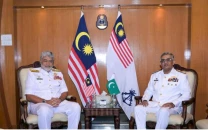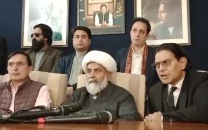Did not transgress my constitutional authority, says former CJP
Saqib Nisar speaks at the Pakistan Breakfast, World Economic Forum

Pakistani representatives at the World Economic Forum in Davos. PHOTO: EXPRESS
Nisar, who retired as the country's top judge last week, was speaking at traditional Pakistan Breakfast at the World Economic Forum on Thursday.
It was his first public appearance since retirement.
"Pakistan's Supreme Court has not transgressed its authority and has not crossed the line of judicial restraint. Rather the superior judiciary absolutely acted in line with the duty which has been cast upon it under the Constitution", said the former chief justice.
He said fundamental rights were provided in the Constitution and the duties assigned to the superior judiciary under Article 199 of the Constitution.
Balochistan makes a pitch for foreign investment
According to Article 199(C) of the Constitution, he added, it shall be the duty of the high courts to enforce the fundamental rights.
The former CJP argued that the superior judiciary was bound to enforce the fundamental rights. "We were left with no discretion once we came to know there was violation of fundamental rights of the people of Pakistan," he said.
Nisar said he knew dams could not be constructed with Rs20 billion but "the donation campaign created awareness among the masses".
He said that for last 40 years the dams were on the agenda but to no avail.'"Is there no criminal negligence in it," he questioned.
On judicial activism versus judicial restraint, he said: "There is a very thin line between the two but as far as the foundational part of enforcement of fundamental rights is concerned, we should not have put ourselves under the judicial restraints," the former chief justice said. "We alleviated the miseries of people of Pakistan through judicial activism but with caution and care."
Justice (retd) Nisar has often been criticised for interfering in executive's domain while ignoring issues that people face due to delay in dispensation of justice.
"Yes, ordinarily it was not my job as chief justice of Pakistan to visit hospitals and I should not have gone there," he said. "But once it came to my knowledge that the tertiary hospitals did not have the operating setups and essential equipment, I had to visit them."
He said there were 23 fundamental rights enshrined in the Constitution, and the most important right was a right to life.
Four aspects, the ex-CJP said, were important for Pakistan: knowledge, credible leadership, justice system and honesty of purpose.
He hoped corruption will end in the country.
In reply to a question, Justice (retd) Nisar said that there should be a push to reform the bureaucracy.
Balochistan CM Jam Kamal Khan who was also present on the occasion, said change was coming in Pakistan.
For the last 20 years Pakistan, Khan said, has not invested in improving systems and because of this negligence, issues that chief justice spoke about have propped up.
There is a will to improve the system, he added.
There was a crisis in Balochistan's administrative and financial crisis because of a lack of lack of accountability, Khan said.



















COMMENTS
Comments are moderated and generally will be posted if they are on-topic and not abusive.
For more information, please see our Comments FAQ